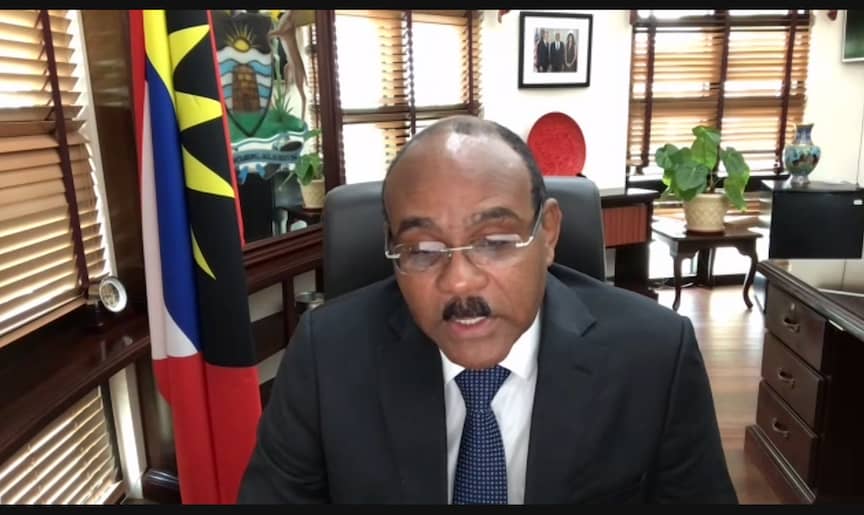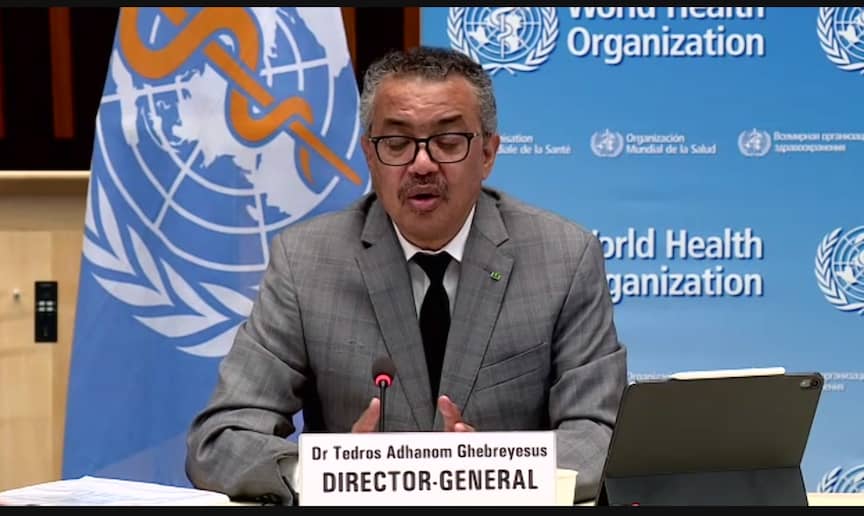
Prime Minister the Hon. Gaston Browne on Friday reiterated a call made earlier this week at the first World Health Organisation forum for Small Island Development States on Health, for the health and well-being of SIDS to be seen as a global human right.
While presenting the opening statement at a joint press conference with the Director General of WHO on Friday, Prime Minister that this view should be universally acceptable within the United Nations system and other development partners.
“This Outcome Statement requires action by all and hinges on urgent intervention in addressing the unique vulnerability of SIDS and the inequalities that stand as obstacles to our development. It also firmly establishes health at the heart of climate action and the need to develop climate resilient health systems,” Prime Minister Browne says.
The country’s leader who is the Chairman of the SIDS grouping added that health and economic resilience cannot be achieved by SIDS without the assistance of the International Community. He pointed out that new inclusive funding mechanisms for sustainable financing should be developed, to include debt for climate swaps and obligatory, compensatory financial instruments for loss and damage, as a result of damage from climate change disasters and for adaptation and mitigation.
“Eligibility for financing should be inclusive and based on vulnerability. To this end, the outcome statement reiterates the call for the development of a multi-dimensional vulnerability index to replace the flawed, per capita income criterion,” Prime Minister Browne stated.
We are pleased to present below the full text of the Prime Minister Statement at the concluding Press Conference held with the Director General of the World Health Organisation Dr. Tedros Adhanom Ghebreyesus.

STATEMENT BY THE HONOURABLE GASTON BROWNE, PRIME MINISTER OF ANTIGUA AND BARBUDA
AT THE PRESS BRIEFING
ON THE SIDS SUMMIT OUTCOME STATEMENT
2ND JULY 2021
Director-General
Members of the Media
Distinguished ladies and gentlemen
I welcome this opportunity to brief the members of the press, on the SIDS Summit Outcome Statement.
First of all, let me thank everyone who participated in the first ever WHO – SIDS summit and for their contribution to the development of this excellent and pragmatic outcome statement, which calls for a healthy and resilient future.
Antigua and Barbuda as the Chair of the Alliance of Small Island States, takes this opportunity to fully endorse the Summit’s Outcome Statement.
The outcome statement captures the vulnerabilities of Small island developing states, which are susceptible to the threats of economic shocks, climate change and the burden of noncommunicable diseases, which have undermined the health and well-being of our citizens and residents.
While mindful of our vulnerabilities and limited capacity, SIDS have been confronting the challenges with their limited resources, but our inadequate resources are now further strained by the impact of the COVID-19 pandemic.
SIDS vulnerabilities have worsened by the COVID-19 pandemic, to the extent that achieving the sustainable development goals and the aspirations of the SAMOA Pathway, will require a multi-dimensional approach, including the support of the international community.
The sustainable development goals’ overarching principle, is to leave no one behind and DIDS are determined to achieve that goal.
This however requires greater global collaboration and cooperation of the international community, to develop more refined, bespoke development pathways for SIDS to effectively confront the challenges they are faced with.
The health and wellbeing of SIDS must be seen as a global human right; justifiable on moral grounds and our common humanity. This should be universally acceptable within the UN system and other development partners.
This Outcome Statement requires action by all and hinges on urgent intervention in addressing the unique vulnerability of SIDS and the inequalities that stand as obstacles to our development.
It also firmly establishes health at the heart of climate action and the need to develop climate resilient health systems.
However, health and economic resilience cannot be achieved by SIDS without the assistance of the International Community.
Hence, new inclusive funding mechanisms for sustainable financing should be developed, to include debt for climate swaps and obligatory, compensatory financial instruments for loss and damage, as a result of damage from climate change disasters and for adaptation and mitigation.
Eligibility for financing should be inclusive and based on vulnerability. To this end, the outcome statement reiterates the call for the development of a multi-dimensional vulnerability index to replace the flawed, per capita income criterion.
The outcome document also calls for ambitious measures to combat climate change and to protect the natural environment.
However, I wish to add that profligate users of fossil fuels, who have contributed to global warming and pollution; whose adverse climate actions have resulted in loss and damages in SIDS, should be legally obligated to make financial reparations for the damages.
This compensation, should include debt write-offs for SIDS, that have had to borrow repeatedly to rebuild from climate damage, resulting in unsustainable debt burdens.
The outcome document addresses the burdens of malnutrition and undernutrition; necessitating interventions to ensure food security and adequate nutrition.
It recommends pooled procurement among SIDS, especially for medicines and medical supplies to reduce costs. Pooled procurement has been successfully practiced in the OECS Caribbean for decades.
It also acknowledges the need to acquire new technologies, including access to digital technologies and the need for access to good quality education and lifelong learning.
While we all can agree that we are small, our dreams and goals extend beyond our borders.
SIDS have led many global initiatives that often times served as the anchor to many international agreements.
We placed NCDs on the global stage, as our countries are particularly affected by NCDs, with unacceptably high rates of morbidity and mortality.
We led the charge for, one-point-five to stay alive, as climate change disproportionately affects SIDS more than any other.
Development challenges like pandemics and diseases; climate change and disasters; economic instability and lack of global economic opportunities compound the vulnerability of SIDS and inhibit our overall development.
despite these challenges, our countries are innovators and movers.
Antigua and Barbuda and other SIDS were among the first, to have eliminated mother to child transmission of HIV.
The small state of Cuba is a leader in healthcare and medicines.
And many other SIDS are promoting the concept of universal healthcare, with significant success despite their fiscal constraints.
While we can list a few accomplishments, the world sometimes turns its back on us – more times than often. COVID-19 is a prime example.
Despite the good effort of the COVAX facility – developed partners are not doing enough.
With the economic onslaught of the pandemic; SIDS have limited access to vaccines; and travel and trade have been curtailed, inflicting great wounds on our economies.
We now run the risk of disintegrating into economic sclerosis, eroding decades of hard won gains.
Our tourism industry is all but at a standstill; our economies are shattered and there is much anxiety amongst our countries of the possibility of a protracted pandemic.
It is therefore our hope that the WHO can begin the process of a pandemic and global health toolkit that is tailored for SIDS.
To achieve the objectives of this Outcome Statement, we must commit to take bold actions, recognizing the interconnectedness of the human health of SIDS and sustainable development.
This requires tackling the social determinants for healthy SIDS, while promoting economic resilience for our countries.
I close by thanking Dr Tedros for his exemplary global leadership, during this most challenging period, and I thank him for his commitment and advocacy on behalf of SIDS.
Finally, We welcome the recommendation for the establishment of a SIDS Leaders Group on Health, for high level advocacy and I charge everyone to use this Summit Outcome Statement as a rallying call, in addressing the health challenges of SIDS.
I thank You.
Advertise with the mоѕt vіѕіtеd nеwѕ ѕіtе іn Antigua!
We offer fully customizable and flexible digital marketing packages.
Contact us at [email protected]

















World dictator traitor tyrant liar Gaston Browne has forgotten Mehul Choksi has human rights too.
Bring all Nigel Christian’s murderers to justice. He was doing his part to stamp out corruption in our nation and was murdered for that. Don’t let his death go in vain.
Comments are closed.